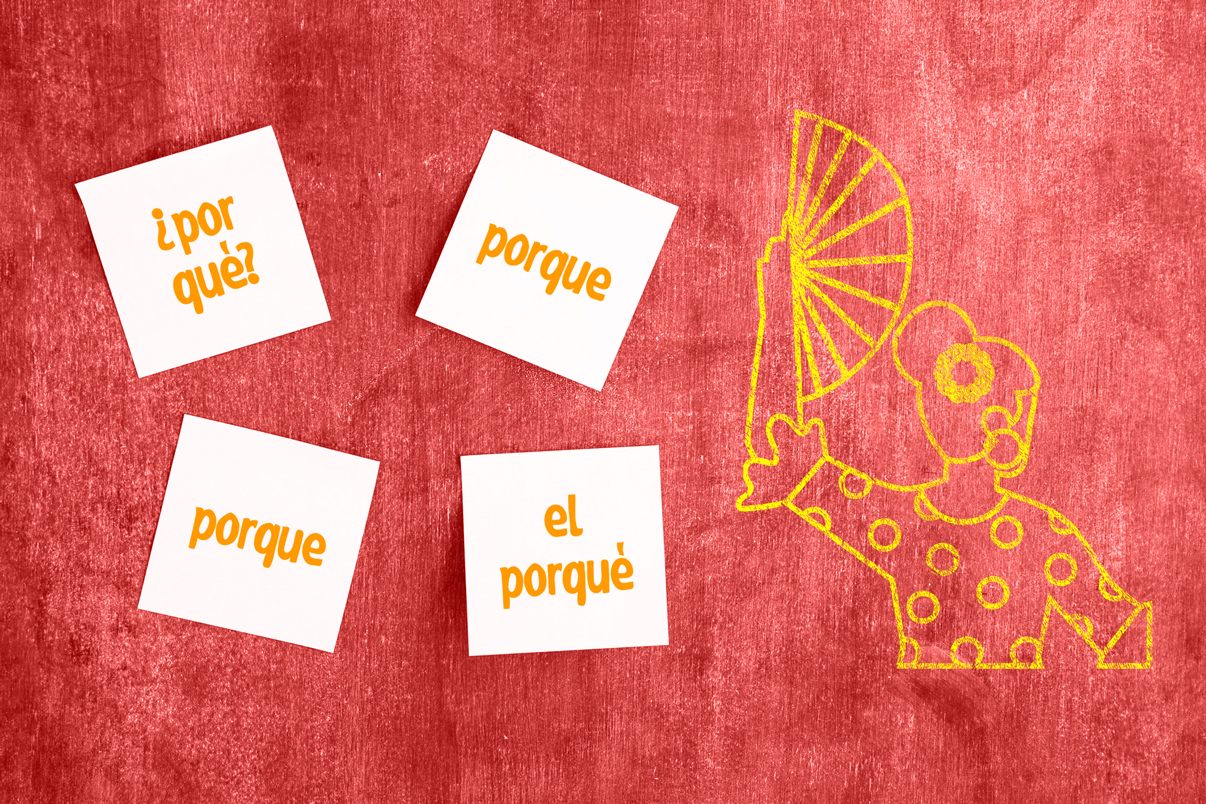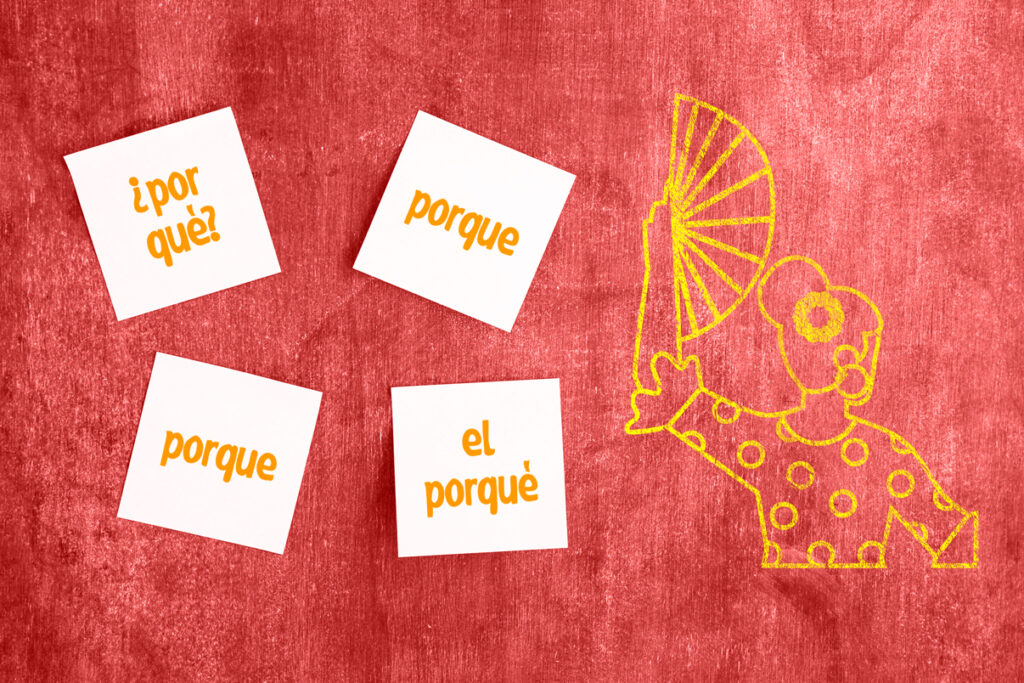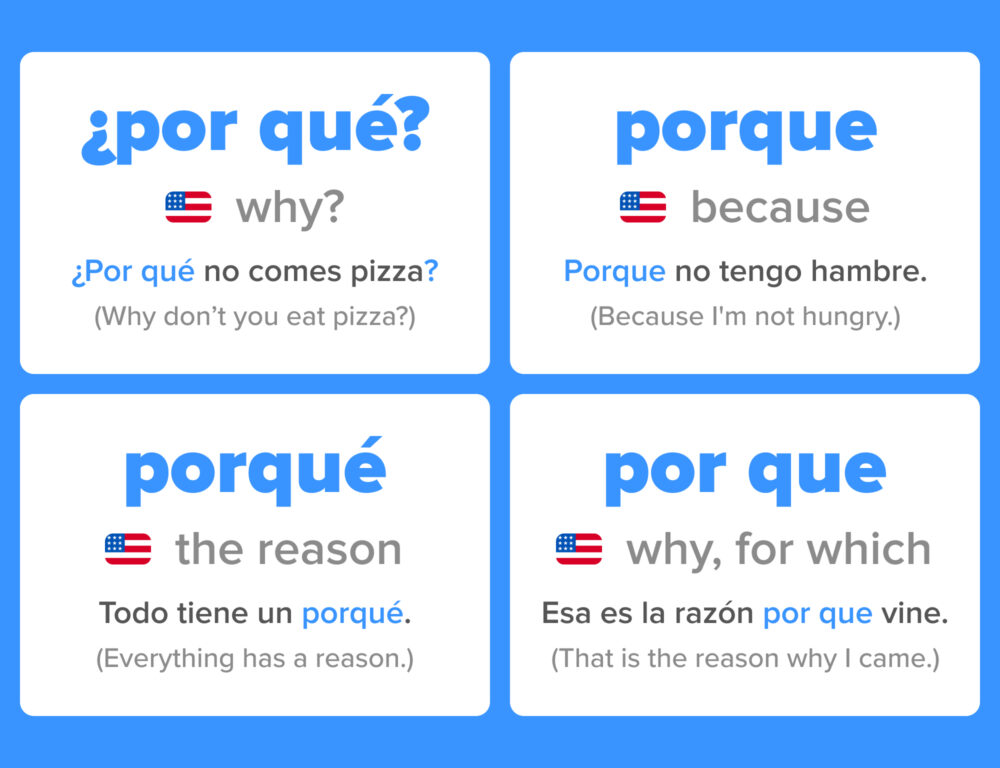
[ad_1]

In Spanish, even the slightest factor, like an area or an accent mark, can change the that means of a sentence fully.
This particularly applies to the Spanish por qué.
Don’t consider me? Carry on studying and be taught in regards to the 4 Spanish por qués to learn the way!
Contents
Obtain:
This weblog publish is accessible as a handy and transportable PDF that you just
can take anyplace.
Click on right here to get a replica. (Obtain)
Distinction Between Por Qué, Porque, Porqué and Por Que
Having so many variations of what appears to be the identical phrase will be complicated.
However in actuality, the best way you spell por que (and whether or not you place an accent or not) modifications its that means.
Let’s check out every of those 4 por ques, their English translations and an instance sentence for every.
| Spanish | English | Instance |
|---|---|---|
| Por qué | Why | ¿Por qué te gusta bailar? (Why do you want to bop?) |
| Porque | As a result of | Me gusta bailar porque yo bailo bien. (I like to bop as a result of I dance effectively.) |
| Porqué | Cause | No necesito un porqué para bailar. (I do not want a purpose to bop.) |
| Por que | Why, for which | Bailo bien. Esa es la razón por que me gusta. (I dance effectively. That’s the reason why/for which I prefer it.) |
The remainder of this publish will go into larger element of every one, however for now, get conversant in their meanings.
It’s additionally value noting that there’s a state of affairs the place all 4 por ques are usually grouped collectively: in texting!
When texting in Spanish, the por que is commonly shortened to pk, pq, xk, or xq.
1. ¿Por Qué? — Why?
Por qué is one of the crucial usually used of the 4 porques. It means “why,” and it’s very simple to make use of as a result of it really works precisely the identical as in English.
If you need to ask why, write por qué. Discover that it’s manufactured from two separated phrases with an accent mark over the e.
Check out the next examples:
¿Por qué has venido? (Why have you ever come?)
¿Por qué no comes pizza? (Why don’t you eat pizza?)
¿Por qué te vas? (Why are you leaving?)
As a query phrase, it will also be utilized in oblique questions:
No sé por qué has venido. (I don’t know why you may have come.)
Me pregunto por qué no comes pizza. (I ponder why you don’t eat pizza.)
Quiero saber por qué te vas. (I need to know why you’re leaving.)
2. Porque — As a result of
In English, if you ask a query utilizing “why,” you’ll in all probability acquire a spoken reply starting with “as a result of.” That is additionally true of Spanish, however our phrase for “as a result of” is definitely one other member of the “porque household.”
1. In Spanish “as a result of” is porque, and it’s written as one phrase with out an accent mark. Use this phrase solely if you find yourself giving your causes:
¿Por qué has venido? Porque tengo tiempo libre. (Why have you ever come? As a result of I’ve some free time.)
¿Por qué no comes pizza? Porque no tengo hambre. (Why don’t you eat pizza? As a result of I’m not hungry.)
¿Por qué te vas? Porque ya es muy tarde. (Why are you leaving? As a result of it’s too late already.)
2. As in English, use porque when reporting occasions as effectively:
Me dijo que no vendría porque no tenía tiempo. (He informed me he wouldn’t come as a result of he didn’t have time.)
Mi hermana me contó que volvió porque se había olvidado la tarjeta de crédito. (My sister informed me she got here again as a result of she had forgotten her bank card.)
Ella cube que no come porque no tiene hambre. (She says she shouldn’t be consuming as a result of she shouldn’t be hungry.)
3. Porque can also be used very equally to para que, to elucidate causes behind actions. For instance:
Te lo dije para que vinieras. (I informed you so that you just’d come.)
Te lo dije porque vinieras. (I informed you so that you just’d come.)
Word that por que can also be a suitable spelling for this utilization, as you’ll see beneath.
3. El Porqué — The Cause
That is the noun type of por que. El porqué is often translated as “the rationale,” or much less generally as “why” (used as a noun).
It’s value noting although that the usage of porqué is definitely fairly uncommon—archaic, even—so don’t anticipate to run into it anytime quickly.
Porqué can be utilized with an article, be plural (as in English “whys” and “wherefores”), be modified by adjectives, and many others. See this fascinating noun in motion:
No entiendo el porqué de tu decisión. (I don’t perceive the rationale behind your determination.)
Me preguntó los porqués de mi decisión. (He requested in regards to the whys (the explanations/the causes) for my determination.)
Un gran porqué se nos presenta. (A robust purpose presents itself.)
4. Por Que — For Which
Por que (two phrases with out an accent mark) is unquestionably essentially the most tough and the least generally used of the 4 porques.
It may be translated as “for which,” however there are going to be occasions when you’ll have to translate it as “why” and even “in order that.”
It’s current solely in two very particular conditions, so if you happen to keep in mind the next two guidelines, you should have no downside with it:
1. Write por que when you may have a preposition (por) and a relative pronoun (que).
In these circumstances, it is possible for you to to translate it as “for which.”
Esa es la razón por que vine. (That’s the reason for which I got here.)
Este es el motivo por que no llamé. (That is the rationale for which I didn’t name.)
2. Write por que when a phrasal verb utilizing por is adopted by que.
Examples of Spanish phrasal verbs that use por will be optar por (to go for, determine), preocuparse por (to fret about, to deal with), luchar por (to combat for), decidirse por (to go for, determine), and many others.
Listed here are some examples:
Opté por que no vinieras. (I made a decision that you just wouldn’t come.)
Me preocupo por que no te pase nada. (I take care in order that nothing occurs to you.)
Lucho por que haya paz en el mundo. (I combat so that there’s peace on this planet.)
Hice lo que pude por que no llegáramos tarde. (I did what I might in order that we wouldn’t be late).
Por Qué Follow Quiz
Nothing beats truly attempting to decide on the right por qué to really see in case your abilities are enhancing.
Take a look at these sentences to see in the event that they want por qué, porque, porqué or por que, after which examine your solutions to see if you happen to’re heading in the right direction.
1. ¿________ no te gustan las chihuahuas? (Why don’t you want chihuahuas?)
2. No puedo beber leche ________ soy alérgica. (I can’t drink milk as a result of I’m allergic.)
3. Estoy feliz ________ me voy de vacaciones. (I’m completely satisfied as a result of I’m happening trip.)
4. La razón ________ me encanta ese restaurante es la pizza. (The explanation I really like this restaurant is the pizza.)
5. El ________ de sus acciones aún no está claro. (The explanation behind his actions remains to be unclear.)
6. ¿________ no vienes a mi casa para la fiesta? (Why aren’t you coming to my home for the social gathering?)
7. ________ tengo que levantarme temprano. (As a result of I’ve to get up early.)
8. La razón ________ tengo que despertarme es para trabajar. (The explanation I’ve to get up is to work.)
9. OK, entiendo ________ no puedes venir. (OK, I perceive why you may’t come.)
10. ¡Pero diviértete, ________ te lo mereces! (However have enjoyable since you deserve it!)
Solutions:
- Por qué
- Porque
- Porque
- Por que
- Porqué
- Por qué
- Porque
- Por que
- Por qué
- Porque
As you may see, por qué is sort of puzzling and it tends to be wrongly used even by native Spanish audio system!
So don’t fear if you happen to can’t grasp it without delay. Begin with the simple ones—por qué and porque—then slowly begin training the others.
Watching genuine Spanish movies may help to see this type of grammar utilized in context. Yow will discover movies on YouTube which can be prone to include these variations.
FluentU additionally has a set of movies, and so they include interactive captions that specify vocabulary in context. By the captions, you may confidently know which por qué is getting used and the way it features.
With fixed publicity to Spanish, you’ll shortly grow to be conversant in these difficult phrases and their mannerisms!
Obtain:
This weblog publish is accessible as a handy and transportable PDF that you just
can take anyplace.
Click on right here to get a replica. (Obtain)
[ad_2]
